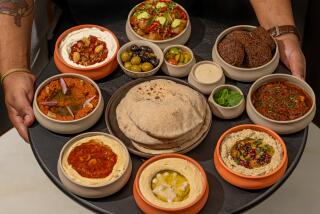The $3 Burden
- Share via
The symbol of Central Asian cookery is the qazan , a hemisphere of heavy cast metal with four lugs around the rim. The lugs are there because originally they made it possible for nomads to tie qazans onto their horses.
You see them everywhere. Kazakh nomads out on the steppes dig holes in the ground, build fires in them and set qazans on top to do their cooking. Central Asian kitchen ranges are often designed with a big hole to accept a qazan. Uzbeks set up sheet-metal qazan -heating braziers in their back yards for the summer pilaf-party season.
Pilaf is a man’s dish in that part of the world, and men have strong opinions about it. Tea houses, which function like liquorless outdoor pubs, often have adjoining kiosks equipped with gas-fired qazans so a group of two-fisted tea-drinkers can arrange to have a decent pilaf with their green tea, one of their own number doing the cooking. Or a couple of groups can have a pilaf-cookoff, like a chili contest in the States.
When I was in Uzbekistan last September, I desperately wanted a qazan . But how does a guy buy a qazan in a burg like Tashkent? They’re for sale in Univermags, the government-owned department stores, but you have to buy them with ration coupons. Needless to say, I didn’t have any.
I figured I was going to have to leave the country without a big, heavy pot to lug from airplane to airplane until a college kid pointed out the people who stand in front of Univermags selling off their ration coupons. I gave him enough money to buy the coupons (he also bought the qazan for me; my non-Uzbek looks and lack of local ID could have ruined the deal), and I became a proud qazan owner.
How wonderful. It’s solid aluminum, weighs 10 pounds, carries sharp flanges and numberless pits due to a crude job of casting, rings like a somber temple bell if struck, and cost me about $3.
From Tashkent to Istanbul to Brussels to Newark to LAX, everybody wanted to know what I was hauling around. The only people who didn’t ask were the U.S. Customs officers in Newark. They just waved me through, with a look that said, “This guy’s too stupid to be a smuggler.”
Go ahead and laugh, fellas. I’m going to be the pilaf-meister of my block.
More to Read
Sign up for Essential California
The most important California stories and recommendations in your inbox every morning.
You may occasionally receive promotional content from the Los Angeles Times.

![LOS ANGELES, CA - JUNE 17: [Cody Ma and Misha Sesar share a few dishes from their Persian Restaurant Azizam] on Monday, June 17, 2024 in Los Angeles, CA. (Ethan Benavidez / For The Times)](https://ca-times.brightspotcdn.com/dims4/default/7ffc7f6/2147483647/strip/true/crop/5110x3417+306+0/resize/320x214!/quality/75/?url=https%3A%2F%2Fcalifornia-times-brightspot.s3.amazonaws.com%2F79%2Fdc%2F4d29255545f5b9813315901692bc%2F1459972-fo-azizam-review20-eba.JPG)











